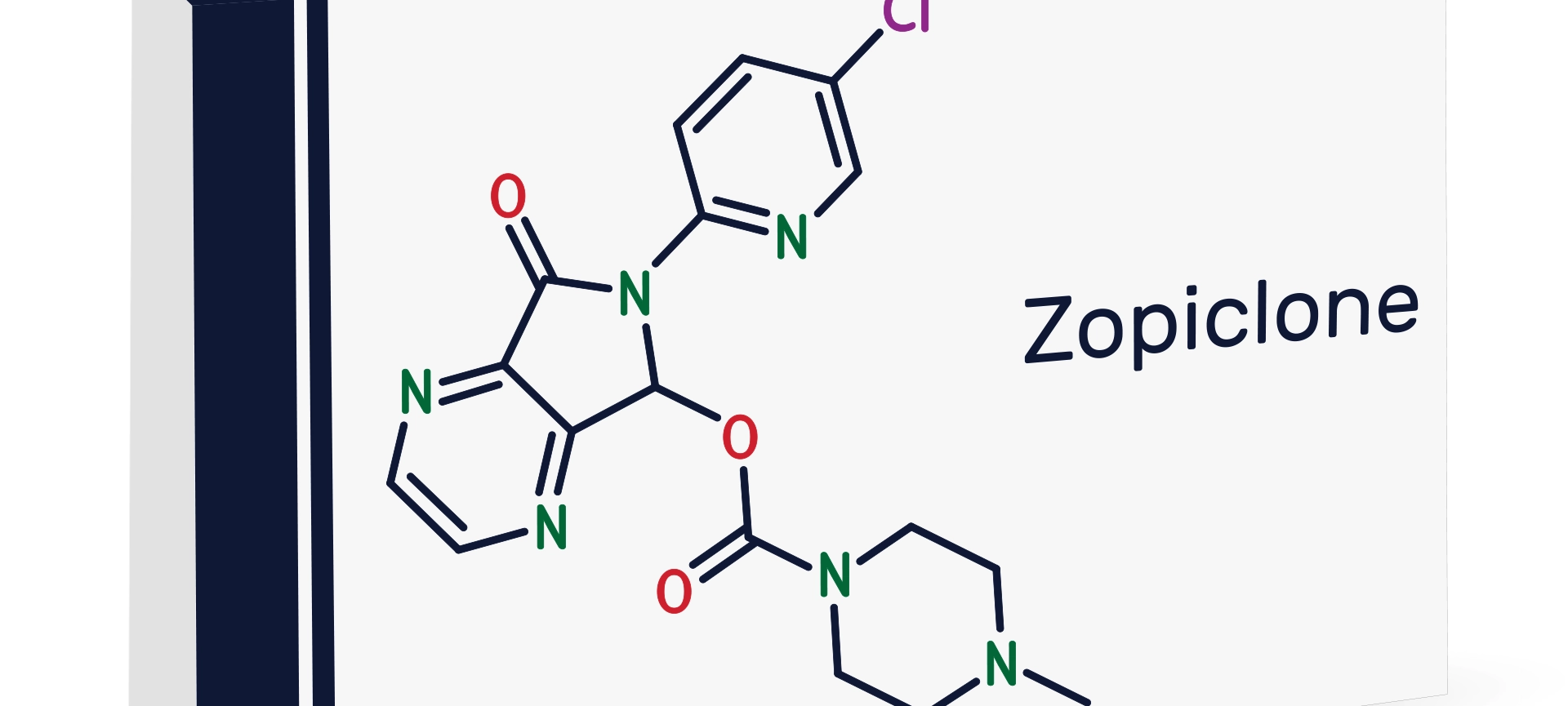If you’ve ever struggled with sleep, you know how frustrating it can be. Lying awake, tossing and turning, watching the hours on the clock tick by, and knowing that the next day will be exhausting. In these moments, you might have considered turning to medications to help you sleep, and one such medication is Zopiclone.
Zopiclone, often sold under the brand names Imovane and Zimovane, is a medication primarily prescribed to help with insomnia. It falls into a class of drugs known as sedative-hypnotics. These drugs are designed to calm your brain and central nervous system, making it easier to fall asleep and stay asleep.
This blog is your complete guide to using Zopiclone. We’ll explain how it works, the potential for Zopiclone dependency and provide recommendations for safe usage.
How Zopiclone Works
Zopiclone works by enhancing the effects of a neurotransmitter called gamma-aminobutyric acid (GABA) in the brain. GABA is responsible for reducing brain activity and promoting relaxation. Zopiclone binds to certain GABA receptors, thereby increasing the calming effects of GABA. This helps you feel drowsy and ready for sleep.
Zopiclone’s action makes it ideal for treating a variety of sleep problems, including:
- Difficulty falling asleep
- Waking up too early
- Sleep problems caused by pain
- Waking halfway through the night
The usual dose of Zopiclone for adults is 7.5 milligrams, taken just before bedtime. It’s crucial to follow your doctor’s instructions carefully. Taking more than the prescribed dose can lead to harmful side effects and increase the risk of addiction.
There’s also the risk of addiction and dependency with Zopiclone. That’s why doctors will insist you don’t use it for more than four weeks. Any longer, and the risk of tolerance, dependence and addiction increases exponentially.
Who Should Avoid Zopiclone
Zopiclone is not suitable for everyone. If you have a history of substance abuse or addiction, it’s crucial to inform your doctor before starting this medication. Pregnant or breastfeeding individuals should also avoid Zopiclone, as it can pass into breast milk or affect the fetus.
What to Avoid While Using Zopiclone
Avoid activities requiring mental alertness, such as driving or operating heavy machinery while using Zopiclone. You should also avoid drinking alcohol as it enhances the drug’s sedative effects.
Related Article: The Risks and Dangers of Opioid Addiction
Side Effects of Zopiclone
Like any medication, Zopiclone can have side effects. Common side effects include:
- Bitter or Metallic Taste: Many people who take Zopiclone report experiencing a bitter or metallic taste in their mouth. This side effect is relatively common and usually not serious.
- Dry Mouth: Dry mouth is another common side effect of Zopiclone. It can be bothersome but is typically not harmful.
- Daytime Sleepiness: One of the significant concerns with Zopiclone is daytime sleepiness. This medication can lead to drowsiness during the day, impairing your ability to stay alert and focused.
- Reduced Alertness: Zopiclone can reduce alertness, making activities such as driving or operating heavy machinery dangerous. It’s crucial to avoid such activities while under the influence of the drug.
- Feeling Dizzy or Sleepy: Some individuals may experience feelings of dizziness or excessive sleepiness while taking Zopiclone.
It’s essential to remember that not everyone will experience these side effects, and some individuals may tolerate Zopiclone well. However, if you do experience any of these side effects and they are severe or persistent, it’s important to consult with your healthcare provider.

Addiction Potential of Zopiclone and How to Prevent It
One significant concern with Zopiclone is its potential for dependence and addiction. While it is generally safe when used as prescribed for short-term insomnia, misuse can lead to addiction.
Zopiclone’s primary mechanism of action lies in its interaction with the brain’s GABA (gamma-aminobutyric acid) neurotransmitter system. GABA inhibits brain activity, induces relaxation, and promotes sleep. Zopiclone enhances GABA’s effects, creating a sense of calm and tranquillity, making it highly sought after for those struggling with sleep.
Over time, your body can develop tolerance to Zopiclone. This means that the initial dose becomes less effective, compelling individuals to increase their dosage to achieve the same sleep-inducing effects. This escalation in dosage is a red flag for potential addiction.
Zopiclone is also known to impact brain chemistry. Chronic use can lead to changes in GABA receptor sensitivity. As the brain becomes accustomed to the drug’s influence, it may reduce its natural production of GABA, making it increasingly difficult to fall asleep without Zopiclone. This alteration in brain chemistry can reinforce dependence.
Key Indicators of Zopiclone Addiction
Recognizing addiction to Zopiclone is crucial for early intervention. Key indicators include:
- Craving: A strong desire to use Zopiclone regularly.
- Escalating Dose: Needing higher doses to achieve the same effect.
- Failed Attempts to Quit: Repeatedly trying to stop or cut down on Zopiclone without success.
- Neglecting Responsibilities: Prioritizing drug use over daily responsibilities.
- Social Isolation: Withdrawing from friends and family due to drug use.
- Doctor Shopping: Seeking multiple prescriptions or obtaining Zopiclone from different sources.
- Continued Use Despite Harm: Using Zopiclone despite experiencing physical or psychological harm.
To Prevent Zopiclone addiction
- Only use it as prescribed: Only take Zopiclone as directed by your healthcare provider. Do not increase or use the dosage for an extended period without medical supervision.
- Short-term use: Zopiclone is intended for short-term use. If your insomnia persists, consult your doctor to explore alternative treatments.
- Avoid combining with other substances: Do not mix Zopiclone with alcohol or other drugs, as it increases the risk of addiction and harmful side effects.
- Regular monitoring: Consult your healthcare provider if you rely on Zopiclone frequently to sleep. They can help you address underlying sleep issues or consider alternative treatments.
What to Do If You’re Dealing with a Zopiclone Abuse Problem
If you or someone you know is struggling with Zopiclone addiction, it’s crucial to seek help promptly. Addiction is a treatable condition, and there are several options available, including:
- Talk to a healthcare professional: Start by discussing the issue with a Zopiclone addiction treatment professional. They can provide guidance and recommend treatment options.
- Consider therapy: Behavioral therapy, such as cognitive-behavioral therapy (CBT), can be effective in treating addiction.
- Support groups: Joining a support group or attending addiction recovery meetings can provide valuable peer support.
- Medication-assisted treatment: In some cases, medications may be prescribed to help manage withdrawal symptoms and cravings.
Remember that seeking help is a sign of strength, and recovery is possible with the right support and resources.
Related Article: The Importance of Aftercare in Sustaining Long-Term Sobriety

Talk to a Professional about Zopiclone Addiction
Despite its varied benefits for improving sleep routines, the risk of Zopiclone addiction is real. More importantly, it’s not a situation that should inspire shame or silence. Instead, you should talk to an addiction care professional about it.
Here at Addiction Rehab Toronto, we offer personalized programs for treating Zopiclone addiction. Our approach to addiction treatment is holistic, touching on behavioural patterns and helping you build resilience that promotes sobriety and overall well-being. Call us today at 1-855-787-2424 to schedule an appointment.







